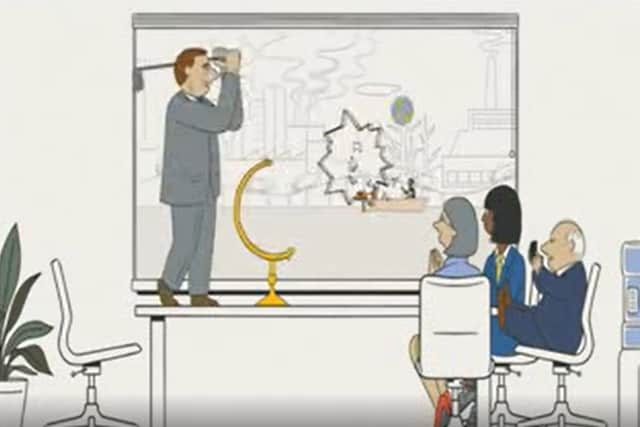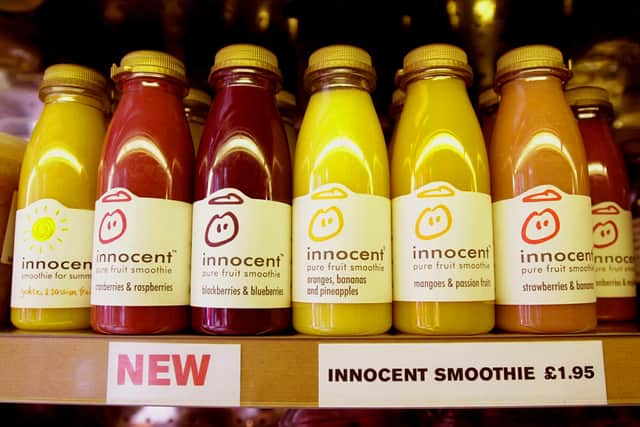Why was Innocent drinks advert banned? Greenwashing claims explained after complaints firm ‘misled’ customers
and live on Freeview channel 276
The drinks company Innocent has had an advert banned by the Advertising Standards Authority (ASA) after it ruled the firm’s ad “misled” customers over the brand’s environmental impact.
Environmentalists, including the activist group Plastics Rebellion, complained the ad implied that drinking smoothies from a disposable plastic bottle was good for the environment.
Advertisement
Hide AdAdvertisement
Hide AdInnocent is now not allowed to use the advert in its current form, or make claims about the supposed environmental merits of its products without proof for them.
What was in the advert?
The adverts show animated characters encouraging people to "get fixing up the planet" by buying Innocent drinks.
The TV, YouTube and video on demand ads showed animated characters singing the lyrics: “We’re messing up the planet. We’re messing up real good,” against a backdrop of buildings and vehicles expelling pollutants, litter and dirty rivers.
An otter then produces a guitar and continues: “OK, let’s try this instead,” then sings: “Let’s get fixing up the planet. Fix it up real good,” as the background changes to a greener, brighter colour scheme with images of trees being planted.


Advertisement
Hide AdAdvertisement
Hide AdThe song concludes: “Reduce. Re-use. Recycle. Because there is no planet B. If we’re looking after nature she’ll be looking after me,” accompanied by images of people relaxing in a lush green environment, with many of them alongside bottles of Innocent drinks.
At the end of the ad, a voice-over states: “Innocent. Little drinks with big dreams for a healthier planet.”
Why was the advert banned?
Twenty-six viewers complained to the ASA that the adverts misled customers by exaggerating the "total environmental benefits" of the drinks.
The ASA ruled in favour of the complainants - it found that Innocent’s advert drew a strong association between the drinks and a positive impact on the environment.
Advertisement
Hide AdAdvertisement
Hide AdThe ruling states that “many consumers would interpret the overall presentation of the ad to mean that purchasing Innocent products was a choice which would have a positive environmental impact”.
The watchdog noted that Innocent’s drinks bottles included non-recycled plastic and that the extraction of raw materials and subsequent processing of those materials in order to produce the bottle would have a negative impact on the environment.


The ASA said: “Although we acknowledged that Innocent were undertaking various actions which were aimed at reducing the environmental impact of their products, that did not demonstrate that their products had a net positive environmental impact over their full life cycles.
“We also noted that their drinks bottles included non-recycled plastic and that the extraction of raw materials and subsequent processing of those materials in order to produce the bottle would have a negative impact on the environment.”
Advertisement
Hide AdAdvertisement
Hide Ad“Because the ads implied that purchasing Innocent products was a choice which would have a positive environmental impact when that was not the case, we concluded that the ads were misleading,” the ASA added.
What are the greenwashing claims?
Greenwashing is considered an unsubstantiated claim to deceive consumers into believing that a company’s products are environmentally friendly.
A spokesperson for Plastics Rebellion said: “You can’t be a major contributor to a global health and environmental emergency and claim to fix up the planet.
“Innocent are being disingenuous about the dangers of plastics threat to human health and environment, as well as trivialising the horrific scale of the problem by repeating the mantra ‘reduce, reuse, recycle’.”
Advertisement
Hide AdAdvertisement
Hide Ad“They’re guilty of brushing the plastic crisis under the carpet and trivialising it,” they added.


What has Innocent said?
Innocent said the ads did not suggest that buying the products themselves would lead to a positive environmental impact, but were rather a statement about its wider environmental goals.
The company warned the ASA that upholding the complaints could stifle other brands and manufacturers from taking steps towards and communicating positive environmental actions they were taking.
Acknowledging that it used packaging made from single-use plastic, Innocent said its focus as a company was on using the minimum amount of plastic while also supporting recycling.
Its ambition was to recycle 70% of their bottles by 2023.


Advertisement
Hide AdAdvertisement
Hide AdThe firm also said it was working on developing more sustainable packaging.
Innocent said: “We’re disappointed to see the ruling from the ASA. Our advert was always intended to highlight important global environmental issues and the need for collective action to make a change.
“We transparently share more about the work that we do on sustainability on our website.”
The firm added: “As with any new guidelines, we’d like to work with the ASA and other brands to understand how to align to them to continue the conversation on these important topics.”
How environmentally friendly is the brand?
Advertisement
Hide AdAdvertisement
Hide AdInnocent is owned by Coca-Cola which produces about three million tonnes of plastic packaging a year - equivalent to 200,000 bottles a minute.
In 2019, it was found to be the most polluting brand in a global audit of plastic waste by the charity Break Free From Plastic.
The bottles Innocent sells in the UK contain 50% recycled plastic and 50% virgin material, not including the caps and labels.
Environmental groups have repeatedly campaigned for single-use plastic to be drastically reduced to prevent pollution.
Advertisement
Hide AdAdvertisement
Hide AdScotland has announced it will ban most single-use plastic from June 2022.
A message from the editor:
Thank you for reading. NationalWorld is a new national news brand, produced by a team of journalists, editors, video producers and designers who live and work across the UK. Find out more about who’s who in the team, and our editorial values. We want to start a community among our readers, so please follow us on Facebook, Twitter and Instagram, and keep the conversation going.
Comment Guidelines
National World encourages reader discussion on our stories. User feedback, insights and back-and-forth exchanges add a rich layer of context to reporting. Please review our Community Guidelines before commenting.
